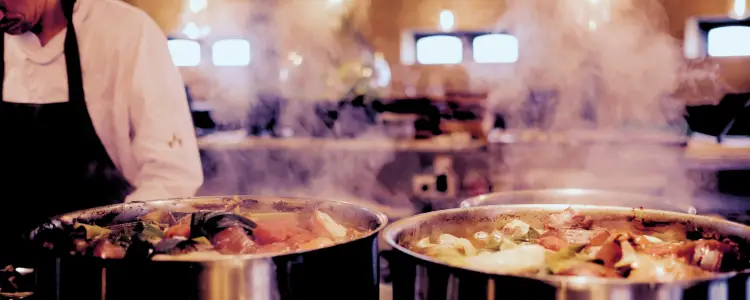A line cook is typically an entry-level position in a kitchen. They are responsible for preparing and cooking food according to the chef’s instructions. Line cooks work on a specific section of the kitchen, such as the grill, fry station, or sauté station. They need to have a basic understanding of different cooking techniques and be able to work quickly and efficiently to keep up with the demands of the kitchen. Line cooks also need to be able to follow recipes accurately and work well under pressure.
A line cook is as the name describes it, maybe not so much in this day and age but in earlier years kitchens would be set out so chefs would be working side by side for example the fryers are also known as the range would be next to the grill and the gill would be next o the stoves or brat pans so basically all the chefs would be working in a line hence the name line cook.
On the other hand, a chef de partie is a more advanced role in the kitchen. They are responsible for managing a specific section of the kitchen, such as the meat station, fish station, or pastry section. Chef de partie needs to have a deeper understanding of cooking techniques, ingredients, and flavor combinations. They are responsible for developing new dishes, creating menus, and training and supervising junior cooks. Chef de parties need to have excellent communication and leadership skills, as well as a keen eye for detail and the ability to manage multiple tasks simultaneously.
In terms of experience, a line cook may have some formal training in culinary school, but they are more likely to have learned on the job. A chef de partie, on the other hand, typically has several years of experience working in a professional kitchen and may have completed formal culinary training.
In summary, while both line cooks and chef de parties work in a professional kitchen and are responsible for cooking food, the chef de partie is a more senior and specialized role that requires more advanced skills and experience.
Questions and answers:
What does a line cook do in a professional kitchen?
A line cook is an essential part of a professional kitchen team, responsible for preparing and cooking food according to the chef’s specifications. They work on a specific station in the kitchen, such as the grill, sauté, or fryer, and are responsible for the dishes that come out of that station. Here are some of the key responsibilities of a line cook in a professional kitchen:
- Preparing ingredients: Line cooks are responsible for preparing ingredients for their station. This includes chopping vegetables, portioning meats, and measuring out ingredients. They need to be able to work quickly and efficiently to keep up with the demands of the kitchen.
- Cooking dishes: Line cooks are responsible for cooking dishes to order. They need to know how to use the equipment in their station, such as grills, ovens, and fryers, and how to cook each dish to the right temperature and consistency. They also need to be able to work quickly to ensure that dishes are prepared and served in a timely manner.
- Following recipes: Line cooks need to follow recipes accurately to ensure that each dish is consistent and meets the chef’s standards. They need to be able to read and understand recipes and measure ingredients accurately.
- Maintaining cleanliness and organization: Line cooks are responsible for keeping their stations clean and organized. This includes cleaning equipment, washing dishes, and sanitizing surfaces. They also need to ensure that their station is well-stocked with ingredients and supplies.
- Communication: Line cooks need to communicate effectively with the other members of the kitchen team. They need to be able to communicate orders and make sure that everyone is on the same page.
In summary, a line cook is responsible for preparing and cooking food in a professional kitchen. They need to be able to work quickly and efficiently, follow recipes accurately, and maintain cleanliness and organization in their station.
What do line cooks wear when working in a kitchen?
A line cook is an essential part of a professional kitchen team, responsible for preparing and cooking food according to the chef’s specifications. They work on a specific station in the kitchen, such as the grill, sauté, or fryer, and are responsible for the dishes that come out of that station. Here are some of the key responsibilities of a line cook in a professional kitchen:
Professional chefs jacket

- Preparing ingredients: Line cooks are responsible for preparing ingredients for their station. This includes chopping vegetables, portioning meats, and measuring out ingredients. They need to be able to work quickly and efficiently to keep up with the demands of the kitchen.
- Cooking dishes: Line cooks are responsible for cooking dishes to order. They need to know how to use the equipment in their station, such as grills, ovens, and fryers, and how to cook each dish to the right temperature and consistency. They also need to be able to work quickly to ensure that dishes are prepared and served in a timely manner.
- Following recipes: Line cooks need to follow recipes accurately to ensure that each dish is consistent and meets the chef’s standards. They need to be able to read and understand recipes and measure ingredients accurately.
- Maintaining cleanliness and organization: Line cooks are responsible for keeping their stations clean and organized. This includes cleaning equipment, washing dishes, and sanitizing surfaces. They also need to ensure that their station is well-stocked with ingredients and supplies.
- Communication: Line cooks need to communicate effectively with the other members of the kitchen team. They need to be able to communicate orders and make sure that everyone is on the same page.
In summary, a line cook is responsible for preparing and cooking food in a professional kitchen. They need to be able to work quickly and efficiently, follow recipes accurately, and maintain cleanliness and organization in their station.
Great T.shirt

Line cooks play a crucial role in the fast-paced environment of a professional kitchen. As such, they must follow specific dress codes and safety regulations to ensure their safety and the safety of others in the kitchen. Here are some of the typical clothing items that line cooks wear while working in a kitchen:
- Chef’s jacket: A chef’s jacket, also known as a chef’s coat, is a long-sleeved white coat that helps protect the cook’s arms from burns and spills. The jacket is typically made of thick, durable material and has double-breasted buttons that can be reversed if one side gets dirty.
- Apron: A kitchen apron is an essential item for line cooks. It protects their clothing from stains and spills while working in a fast-paced, messy environment. Aprons come in various styles, but most have a bib to protect the chest and waist ties to keep the apron secure.
- Pants: Line cooks usually wear thick, durable pants made of cotton or a cotton-polyester blend. The pants should fit comfortably and be easy to move in. Chefs often wear checkered pants to hide stains and spills.
- Non-slip shoes: Slip-resistant shoes are essential for line cooks as the kitchen floor can get slippery from water, grease, or spills. These shoes have a special tread that helps prevent slips and falls.
- Hat: Wearing a hat is necessary to prevent hair from falling into food or being burned by hot oil. Chefs usually wear a white hat or a bandana.
- Gloves: Gloves are used to prevent cross-contamination and to protect the cook’s hands from hot surfaces and sharp objects. Line cooks should use gloves while handling raw meat, cutting vegetables, or working with hot items.
In summary, line cooks wear a specific set of clothing items while working in a kitchen, including a chef’s jacket, apron, pants, non-slip shoes, hat, and gloves. These items help protect the cook’s body from harm and ensure that food is prepared safely and hygienically.
How do you nail a chef interview and get the job?

Some of my articles may contain affiliate links, which means I earn a small commission at no extra cost to you but it does help me with the running costs. As an Amazon Associate, I will earn commissions on purchases but this does not affect my reviews on products or services.
Nailing a chef interview can be a challenging task, especially if you’re competing against other experienced candidates. However, there are several strategies you can employ to stand out from the crowd and increase your chances of getting the job. Here are some tips for nailing a chef interview:
- Research the company: Before the interview, research the company and the restaurant you’re applying to. Learn about the cuisine, the atmosphere, and the clientele. This will show the interviewer that you’re serious about the job and have a genuine interest in working for the restaurant.
- Practice your cooking skills: Prepare some dishes that showcase your culinary skills and bring them to the interview. This will demonstrate your talent and creativity, and give the interviewer a taste of what you can do.
- Highlight your experience: Be prepared to talk about your previous culinary experience and achievements. Focus on the skills and accomplishments that are relevant to the job you’re applying for. Explain how your past experience can contribute to the success of the restaurant.
- Show your passion: The culinary industry is all about passion and dedication. Show the interviewer that you’re passionate about cooking and that you’re eager to learn and grow. Share your culinary inspirations and aspirations, and demonstrate your willingness to work hard and go the extra mile.
- Ask questions: Come to the interview prepared with a list of questions about the restaurant, the cuisine, and the job. This shows that you’re interested in learning more about the position and that you’re serious about the job.
- Be professional: Dress professionally and arrive on time. Make sure your resume is up-to-date and well-organized. Be polite and respectful to everyone you meet, from the receptionist to the chef. Show that you’re a team player and that you’re willing to work collaboratively to achieve the restaurant’s goals.
In summary, nailing a chef interview requires preparation, passion, and professionalism. By doing your research, highlighting your experience, showing your passion, asking questions, and being professional, you can increase your chances of getting the job and launching your culinary career.
- How to Make the Best Homemade White Wine with Fresh Grapes

- Cheddar gorge I was only expecting to find a cheese factory…


